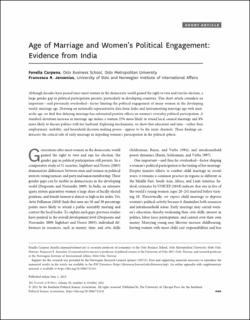| dc.contributor.author | Jensenius, Francesca Refsum | |
| dc.contributor.author | Carpena, Fenella | |
| dc.date.accessioned | 2022-11-03T07:45:37Z | |
| dc.date.available | 2022-11-03T07:45:37Z | |
| dc.date.created | 2021-03-04T10:25:35Z | |
| dc.date.issued | 2020 | |
| dc.identifier.issn | 0022-3816 | |
| dc.identifier.uri | https://hdl.handle.net/11250/3029701 | |
| dc.description.abstract | Although decades have passed since most women in the democratic world gained the right to vote and run for election, a large gender gap in political participation persists, particularly in developing countries. This short paper considers an important—and previously overlooked—factor limiting the political engagement of many women in the developing world: marriage age. Drawing on nationally representative data from India and instrumenting marriage age with menarche age, we find delaying marriage has substantial positive effects on women’s everyday political participation. A standard deviation increase in marriage age makes a woman 25 percent more likely to attend local council meetings, and 8 percent more likely to discuss politics with her husband. Exploring mechanisms, we show that education and time—rather than employment, mobility, and household decision-making power—appear to be the main channels. These findings underscore the critical role of early marriage in impeding women’s participation in the political sphere. | |
| dc.language.iso | eng | |
| dc.subject | India | |
| dc.subject | India | |
| dc.subject | Ekteskap | |
| dc.subject | Marriage | |
| dc.title | Age of Marriage and Women's Political Engagement: Evidence from India | |
| dc.type | Peer reviewed | |
| dc.type | Journal article | |
| dc.description.version | publishedVersion | |
| dc.subject.nsi | VDP::Internasjonal politikk: 243 | |
| dc.subject.nsi | VDP::International politics: 243 | |
| dc.source.journal | Journal of Politics | |
| dc.identifier.doi | 10.1086/712141 | |
| dc.identifier.cristin | 1895540 | |
| cristin.ispublished | true | |
| cristin.fulltext | original | |
| cristin.qualitycode | 2 | |
